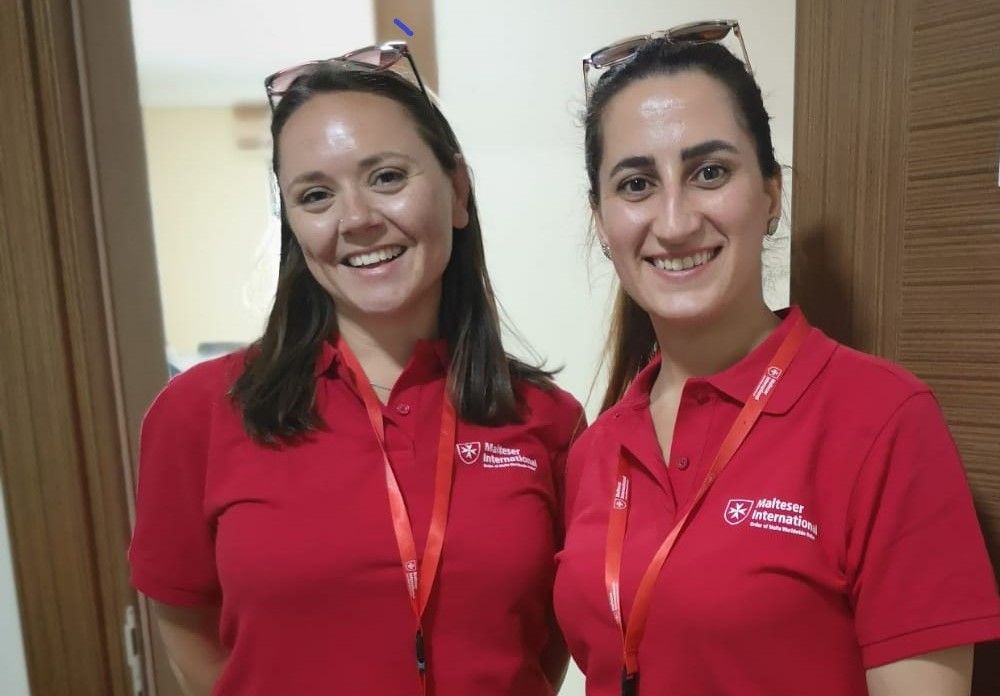#WomenHumanitarians: ''Working for peace between communities is what drives me''
Sarah Markiewicz spent nearly 10 years as a researcher and lecturer of Intercultural Theology at the Humboldt University of Berlin. In 2014, she completed her doctoral studies, writing on the importance of interfaith and intercultural dialogue between Christians and Muslims. The academic turned humanitarian is now Social Cohesion Advisor for Malteser International’s Nineveh Return Program in Iraq and works to facilitate peaceful coexistence and dialogue between the numerous ethnic and religious groups in the Nineveh Plains.
Dr. Markiewicz speaks about her work in humanitarian aid and her experiences as a woman in the sector.
How did you get into humanitarian aid? And why did you become a humanitarian aid worker?
I moved to Jordan in 2014 with a postdoctoral scholarship. My research project focused on Christian-Muslim identities in the Levant and their interactions along religious, national, and ethnic lines. I wanted to understand the perspective of those at the bottom of the food chain – the refugees. So I volunteered with Caritas Jordan in Amman, who were also responding to the Syrian conflict. This was just after ISIS had taken control of Mosul. It was an intense but very interesting experience that opened my eyes to the importance of connecting the academic and humanitarian spheres. It was also clear to me that religion needed to be part of many conversations centered on humanitarian aid.
On my return to Germany in 2015, I volunteered with refugees in response to the European migrant crisis and I became more convinced about my personal desire to work more practically. During the following years, I deepened my expertise in the areas of social cohesion, prevention of violent extremism, youth engagement, interfaith dialogue and drivers of radicalization.
When the position of Social Cohesion Advisor in the Nineveh Return Program in Iraq was advertised, I realized immediately that I had found my calling.

Are there specific moments in your career in which your gender played an important role— positive or negative?
That is hard to say. I went to a progressive, all-girl’s school and was empowered from a young age to believe that I had equal rights and equal opportunities. I have always felt valued by my employers and the overwhelming majority of my colleagues.
In more conservative societies, I have occasionally struggled with being adequately recognized in some professional settings: for instance, some male colleagues would call each other “Dr.” and then call me “Darling”.
When dealing with religious authorities, as I have had to do many times, being a woman immediately puts you in the minority, and there is an extra obligation to observe appropriate clothing and behavior. Men do not face the same level of pressure in this regard.
What stereotypes annoy you or what situations repeatedly happen to you just because you’re a woman in the sector?
I have two pet peeves in the field. The first is that I am usually asked about my age and marital status before being asked about my profession. The second is that my appearance (and that of my female friends and colleagues) is often linked to marriageability which, in some more traditional societies, seems to be of greater value than my value as an educated, working woman.
Did you ever fear for your life? How did your colleagues help in those situations?
I was never in any situation where I seriously feared for my safety. If there is an incident here in Iraq, my colleagues, who have been in worse situations, maintain a calm demeanor that helps keep me calm.
How have other women helped you in your career or how have you helped other women?
I have been supported by both male and female role models. I felt that they supported me on the basis of my passion and drive, and not necessarily because of my gender.
What has greatly helped me is to see such inspirational women in important positions, which makes me think that there is a path for me too working in social cohesion and interreligious dialogue.
As a university lecturer I mentored many students, male and female, and hope that my support was of benefit to them. In fact, three of my former students (all female) will come to Erbil in October to conduct research and write their Master’s theses about the Nineveh Return Program.
What would you say to other young women planning a career in humanitarian aid?
“Go for it!” The first step – landing your first job – is by far the hardest. Try and gain experience through volunteering, chatting with people and doing internships. Humanitarians can sometimes seem like a disorganized lot, but they are very friendly, and will be happy to hear about your interest in humanitarian work.
Finally, what does being a humanitarian aid worker mean to you as a woman?
Working for peace between people and communities is what drives me. I am very aware of my privilege, being born into a family and society that promotes female education and invested in me as a person. It is an honor to be able to learn from other communities and I am also driven to put my skills to good use in the hopes that we can contribute to a positive future for the communities we work with.
August 2019, written by Michael Etoh








